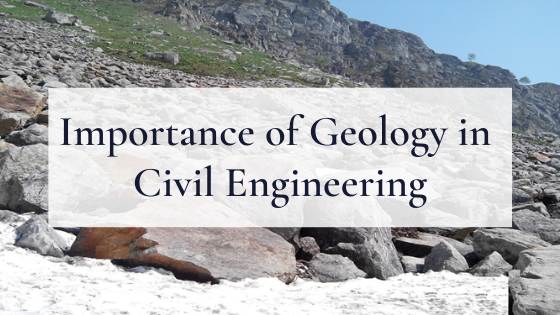An Unbiased View of Specialized Geotechnical Engineering Solutions
An Unbiased View of Specialized Geotechnical Engineering Solutions
Blog Article
All About Specialized Geotechnical Engineering Solutions
Table of ContentsThe Main Principles Of Specialized Geotechnical Engineering Solutions 5 Simple Techniques For Specialized Geotechnical Engineering SolutionsEverything about Specialized Geotechnical Engineering SolutionsSome Known Details About Specialized Geotechnical Engineering Solutions
They conduct site examinations, collect samples, execute lab examinations, and assess information to review the viability of the ground for construction jobs. Based upon their findings, geotechnical designers supply suggestions for foundation layout, slope security, maintaining structures, and mitigation of geotechnical threats. They collaborate with various other specialists, such as architects, architectural designers, and building groups, to guarantee that geotechnical factors to consider are incorporated into the total task design and application.
Structure Design: Geotechnical engineers play an important role in creating structures that can safely sustain the intended framework. They analyze the soil conditions and lots requirements to determine the suitable structure kind, such as shallow foundations (e.g., grounds), deep structures (e.g., heaps), or specialized techniques like soil improvement. They think about aspects such as settlement limits, bearing capacity, and soil-structure interaction to establish optimal foundation designs.
Specialized Geotechnical Engineering Solutions for Beginners
Here are some sorts of geotechnical engineers: Foundation Designer: Structure engineers focus on designing and analyzing structures for frameworks - Specialized Geotechnical Engineering Solutions. They evaluate the dirt problems, load needs, and site characteristics to determine one of the most ideal structure type and style, such as shallow structures, deep foundations, or specialized strategies like heap foundations
They execute area screening, collect samples, and evaluate the accumulated data to characterize the soil residential properties, geologic developments, and groundwater problems at a site. Geotechnical Instrumentation Designer: Geotechnical instrumentation designers concentrate on monitoring and measuring the habits of soil, rock, and structures. They install and keep instrumentation systems that keep an eye on factors such as dirt settlement, groundwater degrees, incline activities, and architectural variations to evaluate efficiency and offer very early warnings of prospective problems.
In the workplace environment, geotechnical engineers make use of specialized software program devices to perform estimations, develop styles, and analyze data. Specialized Geotechnical Engineering Solutions. They prepare reports, testimonial job specs, connect with clients and employee, and coordinate project activities. The office setting gives a conducive setting for research, evaluation, and collaboration with various other specialists associated with the task
They frequently see job websites to conduct website investigations, evaluate geotechnical conditions, and gather information for analysis. These check outs involve taking a trip to various areas, occasionally in remote or difficult surfaces. Geotechnical engineers might perform dirt tasting, conduct tests, and monitor building tasks to ensure that the geotechnical facets of the job are being applied appropriately.
A Biased View of Specialized Geotechnical Engineering Solutions
Geotechnical engineers also operate in specialized geotechnical research laboratories. In these centers, they conduct experiments, carry out tests on dirt and rock samples, and examine the engineering buildings of the materials. Geotechnical lab designers function extensively in these settings, dealing with testing equipment, operating tools, and description tape-recording data. They team up with various other research laboratory personnel to ensure precise and dependable testing outcomes.
Preserving Wall surfaces: Creating walls that hold back soil to avoid landslides and give stability on sloped terrains. Embankments and Earthworks: Designing embankments for roadways, railways, and dams to ensure they continue to be stable under anxiety. The mining industry counts greatly on geotechnical engineering to make sure the security and durability of its procedures.
With this in mind, we have designed our program to prepare pupils for success. Geotechnical engineers are entailed in all phases of the style of frameworks, from idea to building and construction. Their work is necessary in the design and webpage planning procedure as they assess the integrity of soil, clay, silt, sand, and rock, prior to construction beginning.
Top Guidelines Of Specialized Geotechnical Engineering Solutions
This is adhered to by a ground examination based upon the searchings for of the workdesk research and includes test pitting and tasting to discover any type of prospective concerns. Geotechnical designers work within multidisciplinary groups, sustained by intermediate and younger designers as well as by CAD service technicians. As a senior geotechnical designer on a hydro plant task, tasks may include taking part in technical testimonials (e.g., peer testimonials), tailings clog evaluations, dam security reviews, and various other studies connected to the style and building and construction of mine waste centers.
While some experts are experts entirely in geotechnics, others may work under titles like design rock hound or ground designer within similar abilities. As a geotechnical designer, you'll require to: construct and maintain relationships with clients and other professionals included in the site, throughout each projectmaintain safety requirements on website be mindful of cost effects when you make recommendationsstudy geological maps and airborne photos from a variety of sources and from various time periodsexamine building Recommended Reading plans to see how viable they are based on your understanding of the siteinvestigate dangers or geological risks for the sitesearch for environmentally delicate functions, such as landfill beginning to create accurate and interpretive ground modelsplan field investigationsdrill and analyse samples of bedrock, soil, groundwater and extra products oversee other specialists on sitesolve technical issues as they occur, such as unanticipated frameworks at drill sitesmonitor problems during and after construction to see to it frameworks are steady in the short and lengthy termadd data accumulated on site to your initial researchcreate geotechnical estimations, drawings, and two or three-dimensional computer system models analyzing the datamake referrals about the suggested usage of the site.
There are whole lots of opportunities to meet new individuals, as you'll collaborate with an array of professionals at every website. The work can be difficult as you might be accountable for the safety and security of others while on site. There is likewise a high level of monetary duty, as the suggestions you make can have major expense ramifications.

Report this page